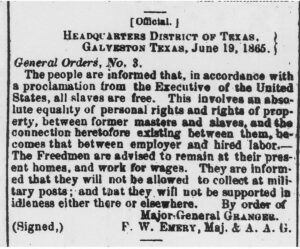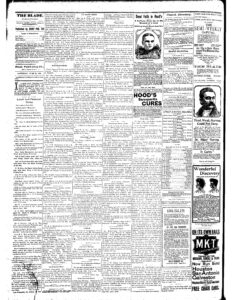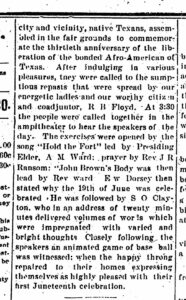Juneteenth (variously called Emancipation Day, Jubilee Day, Freedom Day, or Cel-Liberation Day) is a holiday that commemorates the date when news of the Emancipation Proclamation reached the enslaved black people in Texas. “Juneteenth” is a portmanteau word formed from “June” and “nineteenth.”

Although the Emancipation Proclamation went into effect on January 1, 1863, enslaved Texans were not apprised of this fact until Union Major General Gordon Granger issued General Order No. 3 in Galveston, on June 19, 1865 (Acosta, 2020). While the text of General Order No. 3 announced that “all slaves are free,” it also stated that “Freedmen are advised to remain in their present homes, and work for wages.”
In Austin, freed persons organized the first Emancipation Day celebrations in what is now Eastwoods Park, just north of present-day Dean Keeton Boulevard (Hasan, 2017). Photographs of Austin’s Juneteenth observances in 1900, taken by a Mrs. Grace Stephenson, including this one of celebrants, are available in The Portal to Texas History. According to the Portal metadata, Mrs. Stephenson later sold her photos, along with a report of the day’s festivities, to the San Francisco Chronicle. A search for the article in America’s Historical Newspapers was unsuccessful. A reference staffer from the San Francisco Public Library replied that SFPL is unable to respond to these kinds of reference questions at the moment.

As freed persons dispersed from Texas, they carried with them the tradition of celebrating emancipation on June 19th. The database African American Newspapers, Series 1 has several articles about communities’ Juneteenth celebrations. The earliest reportage was published in the Parsons (KS) Weekly Blade, in 1895.
| Enlarged images of Juneteenth coverage in the Parson’s Weekly Blade from June 22, 1895
|
 |
In 1979, Texas State Representative Al Edwards (D-Houston) introduced House Bill 1016, legislation that led to Texas becoming the first of these United States to declare Juneteenth an official holiday. Today, Juneteenth is an official holiday or observance in 46 states and the District of Columbia (National Juneteenth Observance Foundation, n.d.). While not observed by the University of Texas, Juneteenth (Emancipation Day) is an official public holiday in the state of Texas. Do not get too excited by this, as the state of Texas also lists Confederate Heroes Day on its official calendar of holidays (Texas State Auditor’s Office).
The United Kingdom, which abolished the slave trade in 1807, and passed the Slavery Abolition Act nearly 30 years before the United States, has a related observance on 18 October—Anti-Slavery Day, whose unfortunate name raises inescapable questions about the other days of the year.
 This year, with parades and gatherings being deemed unwise, Austin celebrates Juneteenth virtually. Stay Black and Live will be held online from 6 to 10 p.m. on Friday, June 19, 2020. There will almost certainly be a performance of “Lift Ev’ry Voice and Sing,” also called the Black National Anthem. Learn the words, learn the tune, raise your voices in song on Friday, and raise your voices in citizenship every day.
This year, with parades and gatherings being deemed unwise, Austin celebrates Juneteenth virtually. Stay Black and Live will be held online from 6 to 10 p.m. on Friday, June 19, 2020. There will almost certainly be a performance of “Lift Ev’ry Voice and Sing,” also called the Black National Anthem. Learn the words, learn the tune, raise your voices in song on Friday, and raise your voices in citizenship every day.
Selected Resources from the UT Libraries
- Abernethy, Francis E., ed. (1996). Juneteenth Texas. Denton, TX : Texas Folklore Society.
- African American Newspapers, Series 1, https://guides.lib.utexas.edu/db/618 and Series 2, https://guides.lib.utexas.edu/aans2
- African American Newspapers: The 19th Century. https://guides.lib.utexas.edu/db/10
- African American Periodicals. https://guides.lib.utexas.edu/aap
- Jordan, D., & Jordan, D. (2008). Juneteenth. (2nd ed.). Chicago: Heinemann Library.
- “Describes the holiday known as Juneteenth Day, which has roots in Texas and which celebrates the end of slavery in the United States.”
- Sierra, Sali. (1988). Juneteenth and other freedom celebrations. Chicago: Society for Visual Education, Inc. [filmstrip]
- “Explains the origins and histories of Black freedom celebrations in North America. Tells how, even though the Emancipation Proclamation was issued in 1863, it was not until June 19, 1865, that General Granger landed near Galveston, Tex., and spread the word that slavery had been abolished. Shows that the anniversary of Granger’s landing is celebrated today among Black communities as Juneteenth.”
- Texas Newspaper Archive. https://guides.lib.utexas.edu/db/959
Works Consulted / Additional Reading
- Acosta, Teresa Paloma. (2010, June 15. Modified: 2020, February 21). Juneteenth. In Handbook of Texas Online. Austin : Texas State Historical Association. https://tshaonline.org/handbook/online/articles/lkj01. Access date: June 14, 2020
- The Anti-Slavery Day Act 2010. (2010). U.K. Statutory Instruments, 2010 No. 2325. http://www.legislation.gov.uk/uksi/2010/2325/made. Access date: June 14, 2020.
- Conradt, Stacy. (2018, June 19. Updated: 2020, May 27). 12 things you might not know about Juneteenth. https://www.mentalfloss.com/article/501680/12-things-you-might-not-know-about-juneteenth. Access date: June 14, 2020.
- Emancipation Proclamation. (1862). The National Archives. [online exhibit]. https://www.archives.gov/exhibits/featured-documents/emancipation-proclamation. Access date: June 15, 2020
- General Orders, No. 3. Retrieved from the Briscoe Center for American History. https://www.cah.utexas.edu/db/dmr/image_lg.php?variable=di_01803. Access date: June 8, 2020.
- General Orders, No. 3. U.S. House, 54th Congress, 1st Session (H. Doc. 369, Part 2). “General Order Number 3,” 1896. U.S. Documents Collection. Y 1.1/2: SERIAL 3437
- Gordon Granger. United States, None. [Between 1860 and 1870] [Photograph] Retrieved from the Library of Congress, https://www.loc.gov/item/2018669780/. Access date: June 15, 2020
- Hasan, Syeda. (2017, January 19). Staring down development, neighbors seek historical recognition for Emancipation Park. https://www.kut.org/post/staring-down-development-neighbors-seek-historical-recognition-emancipation-park. Access date: June 14, 2020
- Juneteenth and General Order No. 3. (n.d.). Retrieved from GalvestonHistory.org. https://www.galvestonhistory.org/news/juneteenth-and-general-order-no-3. Access date: June 15, 2020
- Legislative Reference Library of Texas. https://lrl.texas.gov/index.cfm. Access date: June 15, 2020
- National Juneteenth Observance Foundation. http://nationaljuneteenth.com/St_Holiday_Legislation.html
- National Museum of African American History and Culture. (n.d.) The historical legacy of Juneteenth. https://nmaahc.si.edu/blog-post/historical-legacy-juneteenth. Access date: June 8, 2020
- (1895, June 22). Parsons Weekly Blade, p. 4. Available from Readex: African American Newspapers: https://infoweb-newsbank-com.ezproxy.lib.utexas.edu/apps/readex/doc?p=EANAAA&docref=image/v2%3A12B765516BD0CFE8%40EANAAA-12BE0D1D07C169A0%402413367-12BBC9429910C368%403. Access date: June 15, 2020
- Stephenson, Grace Murray. (1900). Emancipation Day celebration. Austin History Center General Collection Photographs. https://texashistory.unt.edu/ark:/67531/metapth124053/. Access date: June 8, 2020.
- Stephenson, Grace Murray. (1900). Emancipation Day celebration band. Austin History Center General Collection Photographs. https://texashistory.unt.edu/ark:/67531/metapth124054/. Access date: June 8, 2020.
- Taylor, Derrick Bryson. (2020, June 13). So you want to learn about Juneteenth? New York Times. Access date: June 13, 2020. https://www.nytimes.com/article/juneteenth-day-celebration.html
- Texas Remembers: Juneteenth. Texas State Library. https://www.tsl.texas.gov/ref/abouttx/juneteenth.html
- Texas State Auditor’s Office. (n.d.). http://www.hr.sao.texas.gov/Holidays/
- U.S. House of Representatives. 54th Congress. (1896). The war of the rebellion: a compilation of the official records or the Union and Confederate Armies. Washington, D.C. : Government Printing Office. https://www.tsl.texas.gov/outofthestacks/wp-content/uploads/2018/06/GeneralOrders3_Juneteenth.pdf. Access date: June 14, 2020


Thank you for the reminders. I didn’t know of The Black National aAnthem, “Lift Ev’ry Voice and Sing,” another awesome thing to learn during COVID-19.
“sidebar”
Mexican President Vicente Guerrero, of Afro heritage, abolished slavery in Mexico in 1829.